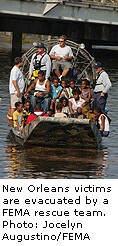
TUESDAY, Aug. 6 (HealthDay News) — Comprehensive mental health services — including diagnosis and treatment — should be an integral part of emergency medical services after disasters, say researchers who analyzed 222 published studies on the issue.
Unlike physical injuries, mental health problems following disasters may not be obvious in victims, according to the authors of the review published in the Aug. 7 issue of the Journal of the American Medical Association.
Studies showed that from 11 percent to 38 percent of “distressed individuals presenting for evaluation at shelters and family assistance centers have stress-related and adjustment disorders; bereavement, major depression,” as well as substance use disorders, the researchers wrote. As many as 40 percent of distressed people had preexisting disorders, they found.
People with more intense reactions to the stress of disasters were more likely to accept referral to mental health services than those with less intense reactions, according to a journal news release.
“Mental and physical consequences of major disasters have garnered increasing attention to the need for an effective community response,” wrote Dr. Carol North, of the VA North Texas Health Care System and University of Texas Southwestern Medical Center at Dallas, and Dr. Betty Pfefferbaum, of the University of Oklahoma Health Sciences Center, in Oklahoma City.
“It is estimated that much of the U.S. population will be exposed to a . . . natural disaster during their lives; adding technological events such as airplane crashes and intentional human acts such as terrorism to this estimate would yield even higher numbers,” they wrote. “Mental health effects of disaster exposures are relevant to informing care for survivors of all forms of trauma, because nine of 10 people are likely to experience trauma in their lifetimes.”
A structured approach to the delivery of “timely and appropriate” mental health services may help ensure that such services are an integral part of the emergency medical response after disasters, the researchers said.
More information
The U.S. National Library of Medicine has more about coping with disasters.
Copyright © 2026 HealthDay. All rights reserved.

